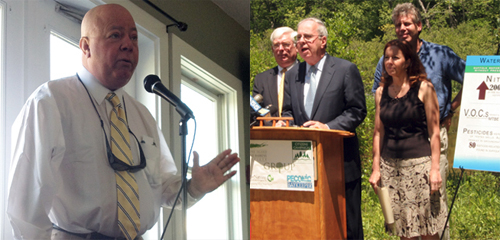DEC hearing on pesticide management plan set for tonight

The battle between environmentalists and farmers over a ban on the use of certain pesticides is heating up, and tonight’s DEC hearing at Suffolk Community College in Riverhead is expected to shine a brighter spotlight on the issue.
At a breakfast meeting at the Hilton Garden Inn in Riverhead Wednesday, members of the Long Island Farm Bureau lamented an environmentalist’s op-ed published in today’s Newsday. In the editorial, Citizens Campaign for the Environment executive director Adrienne Esposito called for a DEC ban on the use of three pesticides detected in Long Island drinking water: imidacloprid, metalaxyl and atrazine.
Farmers said the growing number of restrictions on pesticides used in agriculture is slowing economic development on the East End.
“I had breakfast with Adrienne last week and I said to her, ‘We find pharmaceuticals in groundwater, are we going to ban medicine?’ ” said Long Island Farm Bureau executive director Joe Gergela. “ ‘We’re finding fuel oil, are we going to ban cars and trucks. Why do you think you are going to ban pesticides regardless of the benefit to society?’
“Zero [use of pesticides] is an impossible standard. It cannot be met. It needs to be balanced.”
That’s a message farm bureau members say they plan to send to the state and the public in the coming months as the DEC continues to finalize the Long Island Pesticide Use Management Plan. Mr. Gergela said the Farm Bureau is currently working toward developing a new public relations campaign detailing the economic impact of pesticide restrictions on local farmers.
Environmentalists, meanwhile, say a draft version of the pesticide use management plan doesn’t do enough to protect the public from consuming contaminated drinking water.
“After more than a decade of meetings and written comments, the DEC released a new strategy in January,” Ms. Esposito wrote in her op-ed. “But calling it a strategy is misleading — it’s more like a setback.
“The DEC needs to be more proactive about restricting pesticides that contaminate groundwater,” she wrote.
Tonight’s DEC public hearing is scheduled for 6 p.m. at Suffolk’s Eastern Campus in Riverhead.








